Kumarwa, el Curare. Relato pemón. Versión libre ilustrada. / Kumarwa, the Curare. Pemón story. Free illustrated version.
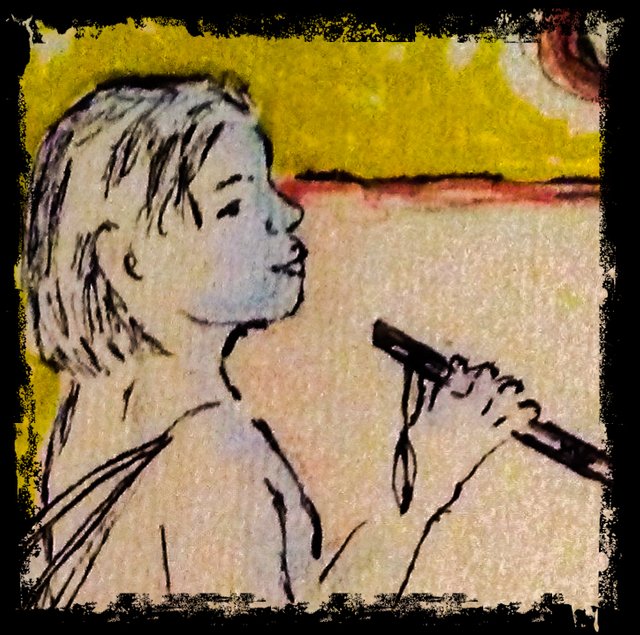
Estimados amigos, hoy quiero dejar para ustedes la ilustración de un relato, de un tauron-panton del pueblo Pemón, el pueblo de “los Hombres”. Habitan la zona sureste del estado Bolívar en Venezuela, en la frontera con Guyana y Brasil.
Son gente dulce. Son gente guerrera.
Son, según Wikipedia, aproximadamente treinta mil personas distribuidas en tres grupos principales:
Taurepan: en la frontera entre Venezuela y Brasil
Arekuna: hacia el Noroeste del Roraima y en el valle de Kavanayén235
Kamarakoto: al oeste del río Karuay, Caroní, la Paragua y en el valle de Kamarata.
El relato que ilustro cuenta cómo los animales trajeron el conocimiento del curare, kumarwa, poderoso veneno que usan los cazadores pemones, y los guerreros.
Desde hace tiempo he tenido deseos de ilustrar algunos relatos tradicionales. Mitos latinoamericanos, relatos indígenas. Hoy lo hago movida por el dolor y la rabia. Yo quisiera invocar el espíritu del curare y castigar a quienes, en esta hora, persiguen a estos venezolanos. A quienes persiguen a sus capitanes. A quienes los hacen huir a la selva. Se trata de la misma vieja historia: el saqueo sin fin de la tierra. La vieja historia de la utilidad del sometimiento. La vieja historia de los malvados que llevan el negocio de ganar a costa del hambre de la gente y del robo.
Mochima caerá.
La versión del relato que escribí es una adaptación (con alguna licencia poética) de la historia recogida en la compilación y traducción ralizadas por Fray Cesáreo de Armellada y Carmela Bentivenga de Napolitano, en 1991 y publicada en Caracas, Venezuela, por Monte Ávila Latinoamericana, bajo el título Literaturas indígenas venezolanas. Visión panorámica actual de las literaturas indígenas venezolanas.
Quedo agradecida por sus lecturas.

Kumarwa
Koko, la abuela, cuenta. Tauron panton…
Los Hombres estaban muy tristes, pues Mochima, el Gran Águila Harpía, los azotaba. Destruía sus casas. Robaba su alimento. Los hombres no podían cazar y los animales se habían vuelto estériles. Mochima los oprimía y mataba sin piedad.
Los animales también estaban muy atribulados, porque compartían la suerte de sus hermanos, los Hombres. En aquel tiempo, los Hombres y los animales hablaban todo el tiempo y cantando se entendían.
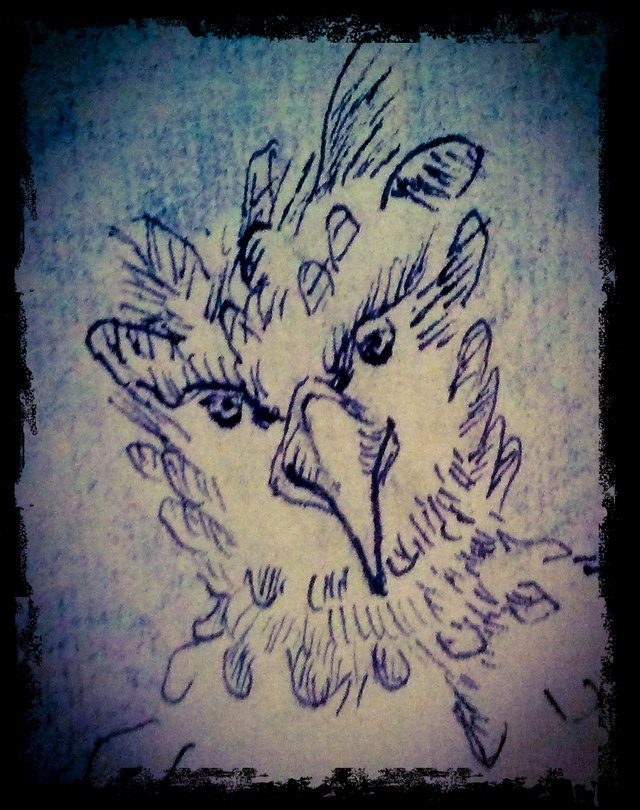
Y aunque la vida era dura bajo la garra de Mochima, los Hombres y los animales encontraban espacio para cantar y hacer cosas juntos. Un día los animales ayudaban a los Hombres a construir la Tapuy, la casa.
Kurachire, el ruiseñor de la selva, cantaba.
Ayiten, el Pájaro Carpintero, traía las lianas.
Maruk, la Gallina, que no vuela ni canta, miraba con atención el trabajo y traía frutos jugosos para que todos saciaran la sed.
Entonces Maruk, la gallina, habló para los hombres y los animales:
“Tenemos que matar a Mochima”.
Pero Hombres y Pájaros pensaron que la gallina se había vuelto loca. Hasta las flechas de Kurak-Titiipan, la Cerbatana Silenciosa, era blanda para el cuero duro de Mochima.
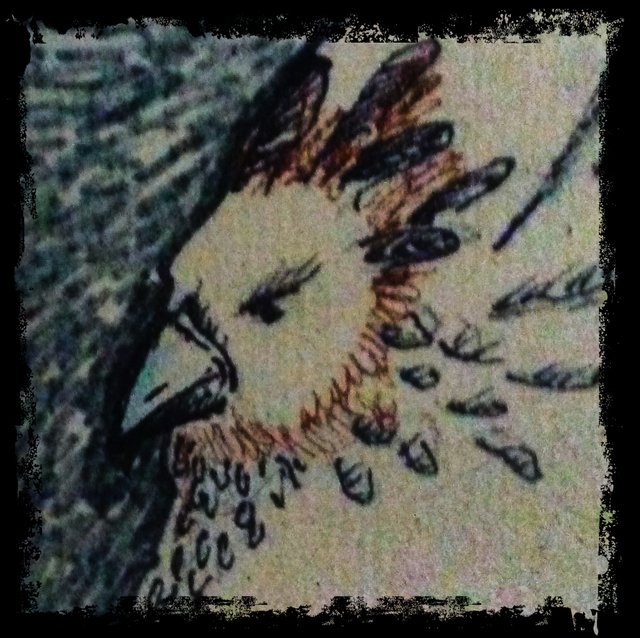
Pero Maruk, la Gallina, seguía insistiendo.
“Hay un árbol en la selva. Cuando me paseo cerca de él, me da ganas de dormir para siempre. La sangre de este árbol da ganas de dormir para siempre. Debemos hablar con él.”
Entonces Maruk se puso al frente y todos los Pájaros y todos los Hombres la siguieron. Caminaron, "sen sen sen y son son son" (dice Koko, la abuela), caminaron mucho hasta encontrar al Árbol-que-hace-dormir-para-siempre.
Pero cuando lo encontraron, tuvieron miedo porque sentían que el árbol atraía el sueño definitivo.

Pero Ayiten, el pájaro carpintero, que tiene una voluntad decidida, se acercó a convencer al árbol para que les diera su sangre. Sin embargo, una vez que se posó en el tronco del árbol, no pudo resistirse y le dio un picotazo…
(“¡Aytuuu!”, dice koko)
Ayiten cayó muerto.
Todos estaban trastornados por la suerte de Ayiten y por el poder del árbol.
Pero Wandanwan, el Comején, que conoce el corazón de los árboles, le hizo un remedio con Kavay, el Tabaco y Ayiten se levantó.
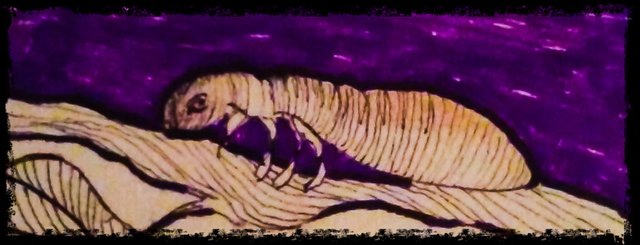
Los Pájaros y los Hombres sabían ahora que la sangre de ese Árbol hacía realmente dormir para siempre. Lo llamaron kumarwa, el que hace dormir para siempre, y con totumitas, las pequeñas vasijas, se llevaron la sangre del árbol.
Los hombres pusieron kumarwa en las flechas de sus cerbatanas.
A los pocos días, Mochima atacó otra vez, con más brutalidad que antes, pero los hombres y los pájaros estaban preparados.
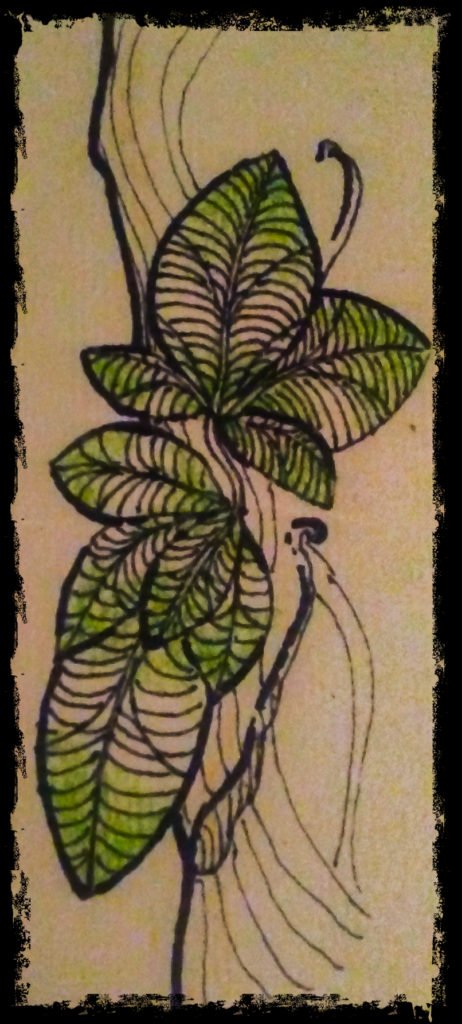
Cuando Mochima recibió la primera flecha, se burló atrozmente de los Hombres y de los Pájaros. Se reía y batía sus plumas, pues cada pequeña flecha no hacía sino arañarle el cuero.
(¡Aytuuu!, dijo koko)
Pero dejó de reír.
Se quedó ciego.
Sus alas se pusieron tiesas.
El frío le estrujó el corazón.
Y los Hombres y los Pájaros fueron libres.

Waküpe kru’man, muchas gracias. Que Kapuy, la Luna, vea por todos.

They are sweet people. They are warrior people.
They are, according to Wikipedia, approximately thirty thousand people distributed in three main groups: Taurepan, on the border between Venezuela and Brazil; Arekuna, to the Northwest of Roraima and in the Kavanayén Valley235; and Kamarakoto, west of the Karuay River, Caroní, the Paragua and in the Kamarata Valley.
The illustrious story tells how the animals brought the knowledge of curare, kumarwa, a powerful poison used by Pemón hunters and warriors.
I have long wanted to illustrate some traditional stories. Latin American myths, indigenous stories. Today I do it moved by pain and rage. I would like to invoke the spirit of curare and punish those who, in this hour, persecute these Venezuelans. Those who persecute their captains. Those who make them flee to the jungle. It is the same old story: the endless looting of the land. The old story of the usefulness of submission. The old story of the wicked who run the business of winning at the cost of people's hunger and theft.
Mochima will fall.
The version of the story I wrote is an adaptation (with some poetic license) of the story collected in the compilation and translation done by Fray Cesáreo de Armellada and Carmela Bentivenga de Napolitano, in 1991 and published in Caracas, Venezuela, by Monte Ávila Latinoamericana, under the title Venezuelan Indigenous Literatures. Current panoramic vision of Venezuelan indigenous literatures.
I am grateful for your readings.
Kumarwa
Koko, the grandmother, tells. Tauron Panton...
The Men were very sad, for Mochima, the Great Harpy Eagle, whipped them. He destroyed their houses. He stole their food. Men could not hunt and the animals had become sterile. Mochima oppressed them and killed without mercy.
The animals were also very troubled, because they shared the fate of their brothers, the Men. At that time, Men and animals talked all the time and singing they understood each other.
And although life was hard under Mochima's claw, Men and animals found space to sing and do things together. One day the animals helped the Men to build the Tapuy, the house.
Kurachire, the nightingale of the jungle, sang.
Ayiten, the Woodpecker, brought the lianas.
Maruk, the Hen, who neither flies nor sings, watched the work attentively and brought juicy fruits so that everyone satiated their thirst.
Then Maruk, the Hen, spoke to men and animals:
"We have to kill Mochima."
But Men and Birds thought the hen had gone mad. Even the arrows of Kurak-Titiipan, the Silent Blowpipe, was soft for the hard leather of Mochima.
But Maruk, the Hen, kept insisting.
"There is a tree in the jungle. When I walk near it, it makes me want to sleep forever. The blood from this tree makes me want to sleep forever. We must talk to him."
Then Maruk took the lead and all the Birds and all the Men followed her. They walked, "sen sen sen sen and son son son" (says Koko, the grandmother), they walked a lot until they found the Tree-that-makes-sleep-for-ever.
But when they found it, they were afraid because they felt that the tree attracted the definitive dream.
But Ayiten, the woodpecker, who has a determined will, approached the tree to convince it to give them its blood. However, once he had landed on the trunk of the tree, he could not resist and pecked it...
("Aytuuu!", says koko)
Ayiten fell dead.
All were disturbed by Ayiten's fate and by the power of the tree.
But Wandanwan, the Comején, who knows the heart of the trees, made him a remedy with Kavay, Tobacco and Ayiten woke up.
Birds and Men now knew that the blood of that Tree really made them sleep forever. They called it kumarwa, the one that sleeps forever, and with totumitas, the small vessels, they took the blood from the tree.
The men put kumarwa on the arrows of their blowpipes.
A few days later, Mochima attacked again, more brutally than before, but the men and birds were ready.
When Mochima received the first arrow, he mocked the Men and Birds atrociously. He laughed and beat his feathers, as each small arrow only scratched his leather.
(Aytuuu!, koko said)
But he stopped laughing.
He went blind.
His wings became stiff.
The cold squeezed his heart.
And the Men and the Birds were free.
Waküpe kru'man, thank you very much. May Kapuy, the Moon, see for all.

Proceso




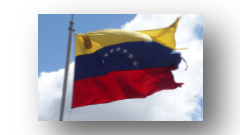


Posted from my blog with SteemPress : http://adncabrera.vornix.blog/2019/02/26/kumarwa-el-curare-relato-pemon-version-libre-ilustrada-kumarwa-the-curare-pemon-story-free-illustrated-version/
Viajaste al corazón de la selva.
Me encantan tus ilustraciones tienen tu carácter, sensibilidad y coraje.
Te quiero muchachita crecida.
Derramo un río de lágrimas por mis hermanos de almas verdes.
Querida @antolinamartell, los que sobrevivimos estamos aplastados por esa atrocidad. Sin embargo, seguimos (sé que tú lo haces), porque nos toca defender con lo que tenemos, y sé que tú lo haces también.
Un abrazo enorme.
Un hermoso post, @adncabrera, tanto por tu versión del cuento pemón escogido como por tus ilustraciones, que me gustaron mucho por su estilo esencial. Además, un post muy pertinente. Saludos.
Una gran historia marcada de ese poder que nuestra Venezuela mantiene y que no todos valoran. ¡Exquisito, @adncabrera!